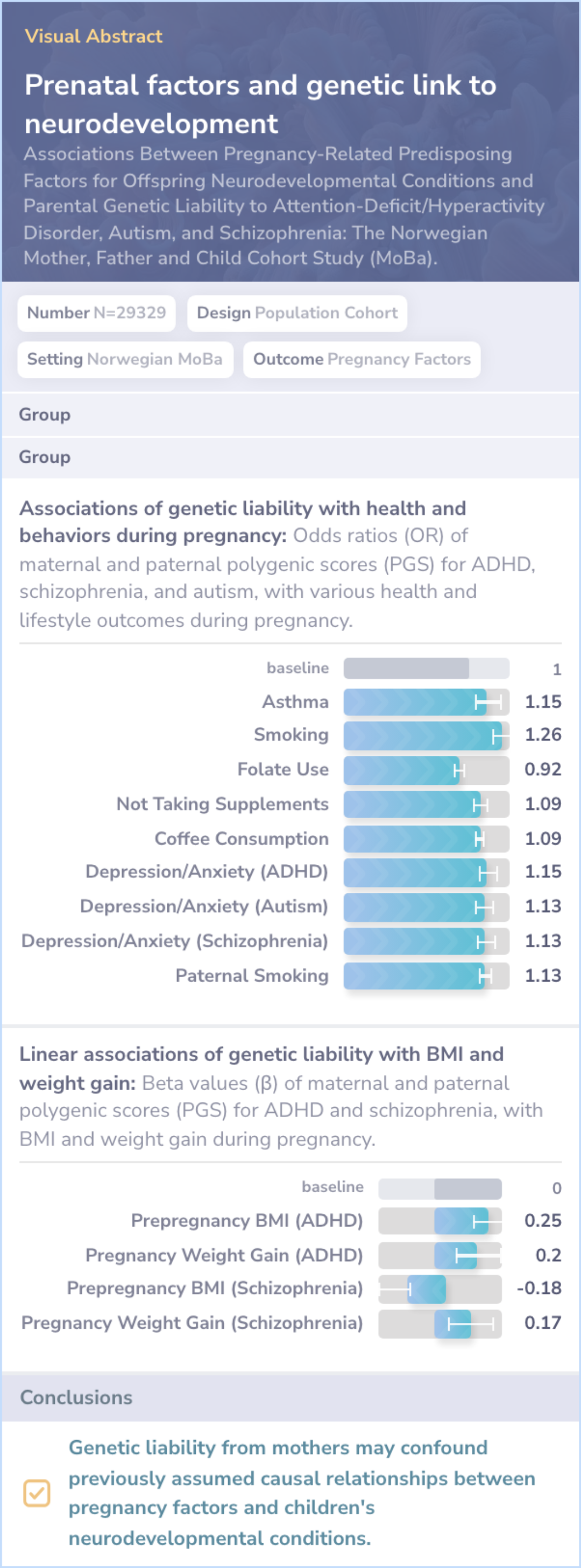Trending ADHD Papers
Visual Abstract
Genetic nurture versus genetic transmission of risk for ADHD traits in the Norwegian Mother, Father and Child Cohort Study
Genetic factors influencing ADHD traits in children
December 9, 2024
author
Pingault JB, Barkhuizen W, Wang B, Hannigan LJ, Eilertsen EM, Corfield E, Andreassen OA, Ask H, Tesli M, Askeland RB, Davey Smith G, Stoltenberg C, Davies NM, Reichborn-Kjennerud T, Ystrom E, Havdahl A
journal
Mol Psychiatry
Date Published
undefined
Why link to a visual abstract?
What is a visual abstract?
Original
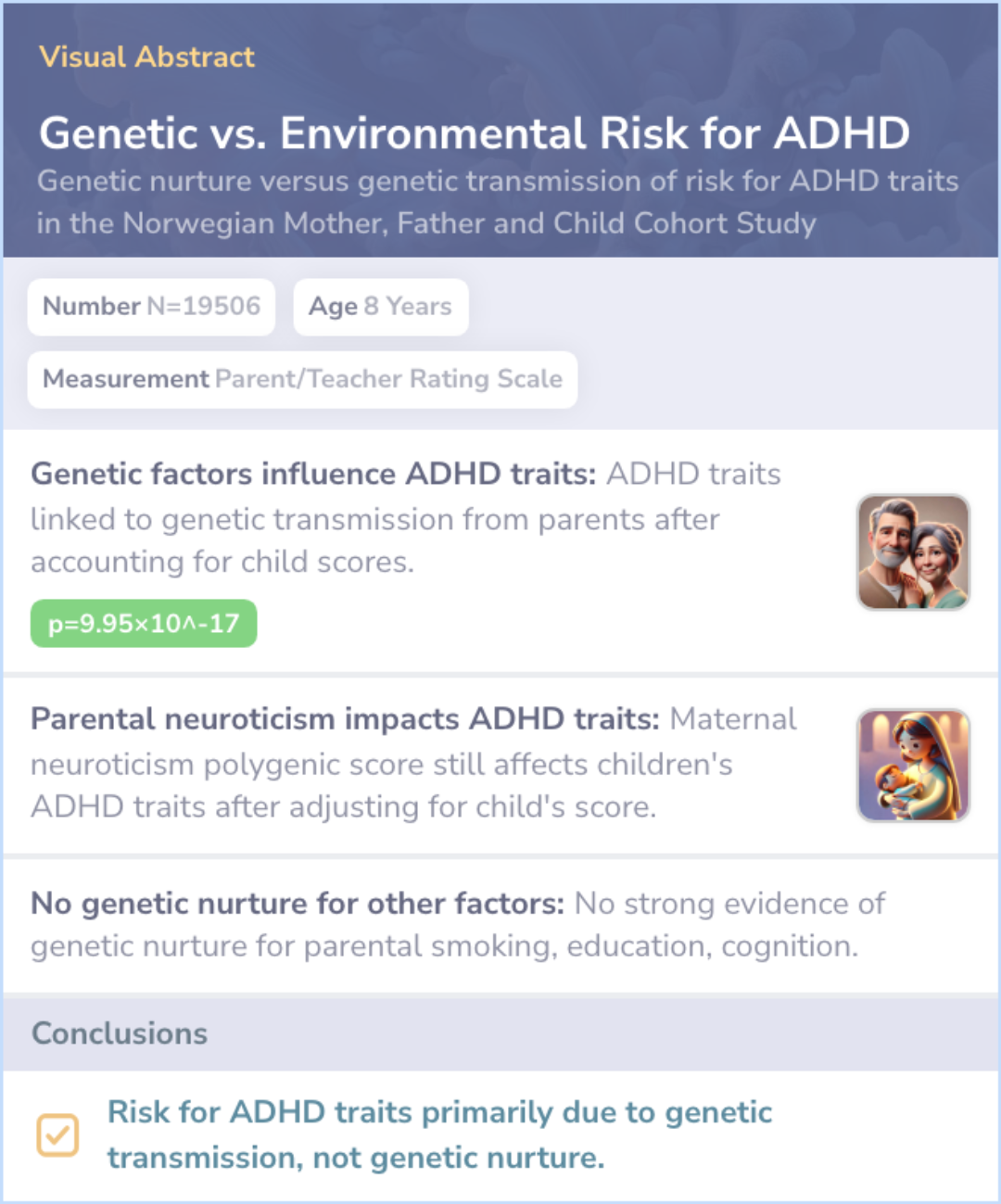
Study Summary
🔬
What They Studied
The study examined whether genetic transmission or genetic nurture influences the risk of children inheriting ADHD traits from their parents.
💡
What They Found
The research found that the transmission of genetic variants from parents largely explains the risk for ADHD traits in children, rather than influences from the environment.
📚
What This Means
These findings highlight that understanding ADHD risk requires focusing on genetic factors rather than assuming parental behavior has a large environmental impact. Unlike other studies focusing on medication like Methylphenidate (Ritalin) and Adderall, this study offers insights into genetic risks rather than treatments.
Study Overview
Background & Objectives
Attention-deficit/hyperactivity disorder (ADHD) is a condition treated with medications like methylphenidate, which elevates norepinephrine and dopamine levels. This study probes how parental genetics influence ADHD traits in children.
The research uses the Norwegian birth cohort to explore if parental genes contribute directly to childhood ADHD risk or if parental behavior plays a significant role.
The research uses the Norwegian birth cohort to explore if parental genes contribute directly to childhood ADHD risk or if parental behavior plays a significant role.
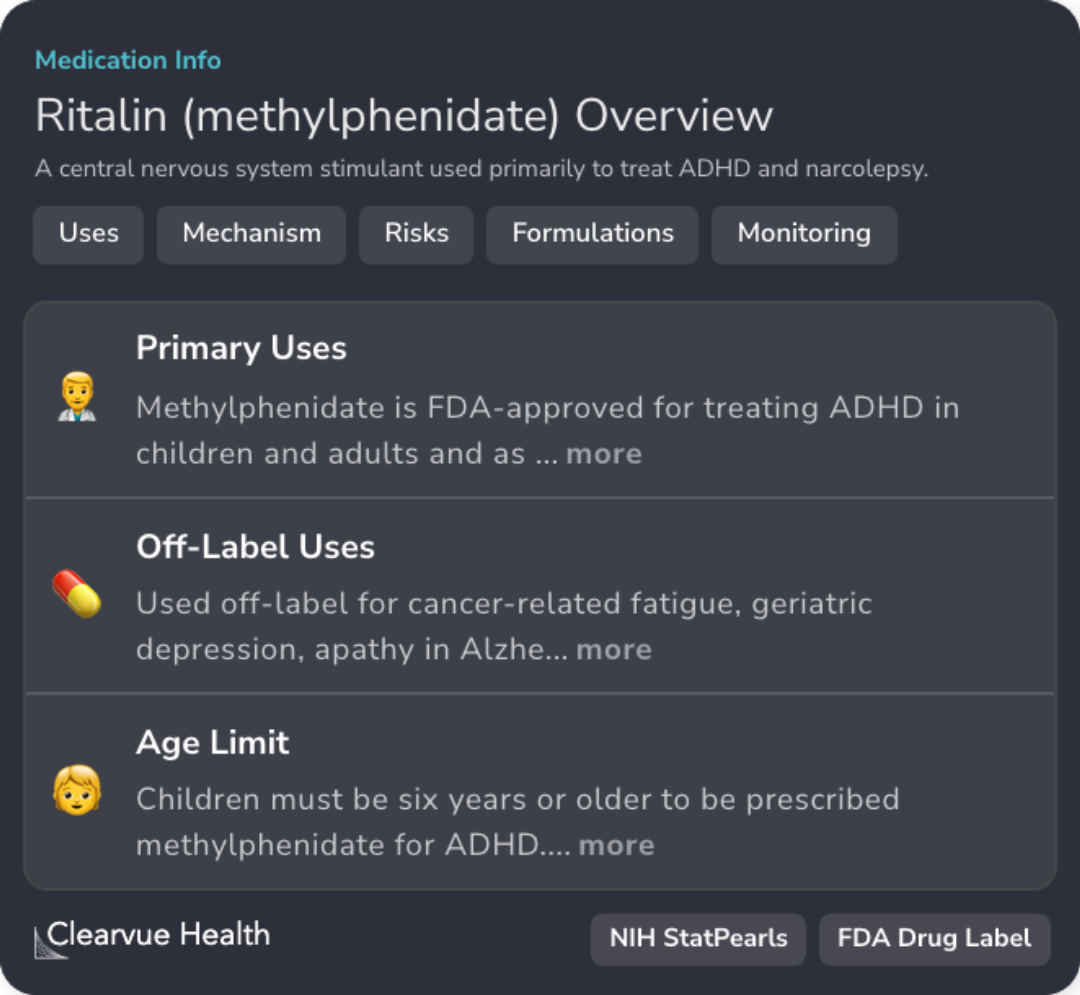
Abstract: background
Identifying mechanisms underlying the intergenerational transmission of risk for attention-deficit/hyperactivity disorder (ADHD) traits...more
Study Summary
Methods
Researchers conducted a study with over 19,000 families in Norway, focusing on genetic connections in mother-father-child trios. They calculated scores that indicate genetic risks related to ADHD for each parent.
Children's ADHD traits were reported by mothers using a standardized scale, allowing researchers to assess possible genetic or environmental impacts on these traits.
Children's ADHD traits were reported by mothers using a standardized scale, allowing researchers to assess possible genetic or environmental impacts on these traits.

Abstract: methods
This birth cohort study included 19,506 genotyped mother-father-offspring trios from the Norwegian Mother, Father and Child Cohort Stud...more
Study Results
Results
The study found that genetic scores of both parents became less relevant after considering child genetic factors, highlighting genetic transmission. This means that children's ADHD traits are influenced more by direct inherited genetics rather than parental traits.
However, the maternal score for neuroticism still showed a connection, hinting at some influence beyond simple genetic inheritance. No other parental factors showed such influence.
However, the maternal score for neuroticism still showed a connection, hinting at some influence beyond simple genetic inheritance. No other parental factors showed such influence.
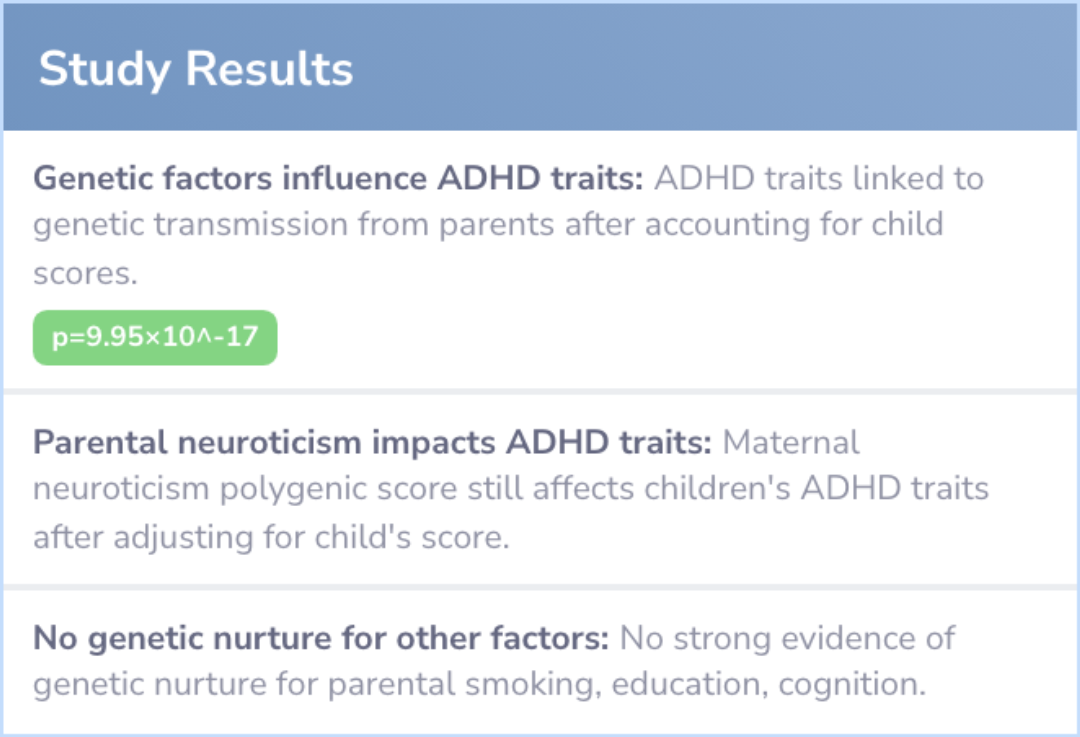
Abstract: results
We found that associations between ADHD maternal and paternal polygenic scores and child ADHD traits decreased significantly when adjus...more
Study Summary
Conclusions
The study concludes that the risk for ADHD traits in children comes mainly from parents passing down specific genetic elements. This finding suggests that what appears as parental influence is often due to inherited genes.
Thus, caution is needed when considering how much parental behavior or environment affects child ADHD, as much is attributed to direct genetic transfer instead of nurture.
Thus, caution is needed when considering how much parental behavior or environment affects child ADHD, as much is attributed to direct genetic transfer instead of nurture.
Abstract: conclusions
Our findings indicate that the intergenerational transmission of risk for ADHD traits is largely explained by the transmission of genetic variants from parents to offspring rather than by genetic nurture. Observational associations between parental f...more
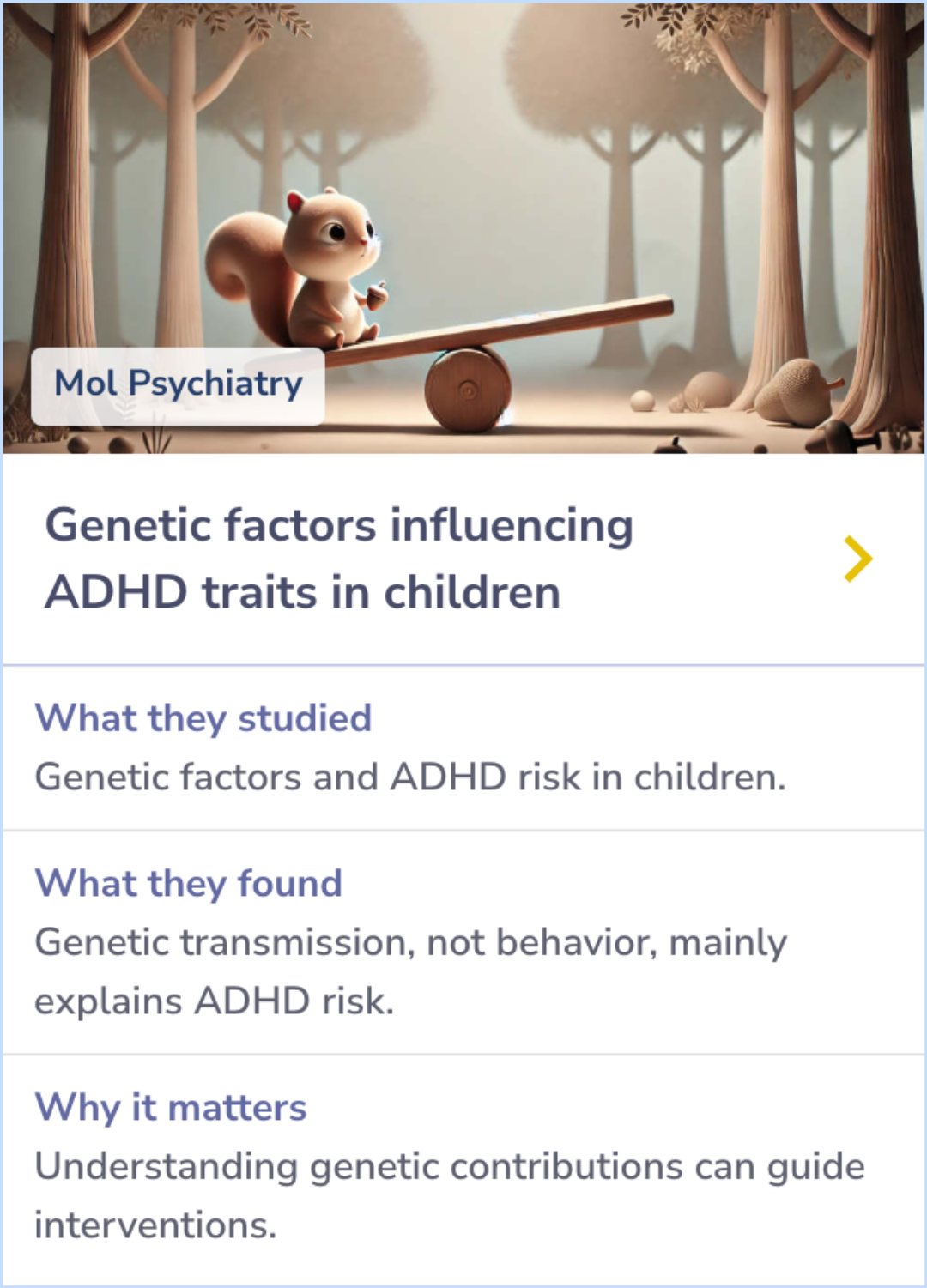
Clinical Guidelines
Guidelines suggest that clinicians should conduct a clinical interview with parents and observe the child to diagnose ADHD, considering its strong genetic component.
Evaluations should include screening for comorbid conditions, such as anxiety and developmental disorders.
Early psychosocial interventions, like PTBM, are recommended for ADHD management.
Evaluations should include screening for comorbid conditions, such as anxiety and developmental disorders.
Early psychosocial interventions, like PTBM, are recommended for ADHD management.
Literature Review
Torvik et al
Core Insight:The main paper suggests genetic transmission plays a larger role in ADHD traits than environmental factors, while this paper highlights that educational attainment affects ADHD and academic issues independently of shared genetics.
What It Adds:
Educational Impact: This paper shows education impacts child ADHD outside of genetics.
Depression Findings: This paper ties depression symptoms more closely to shared genetics.
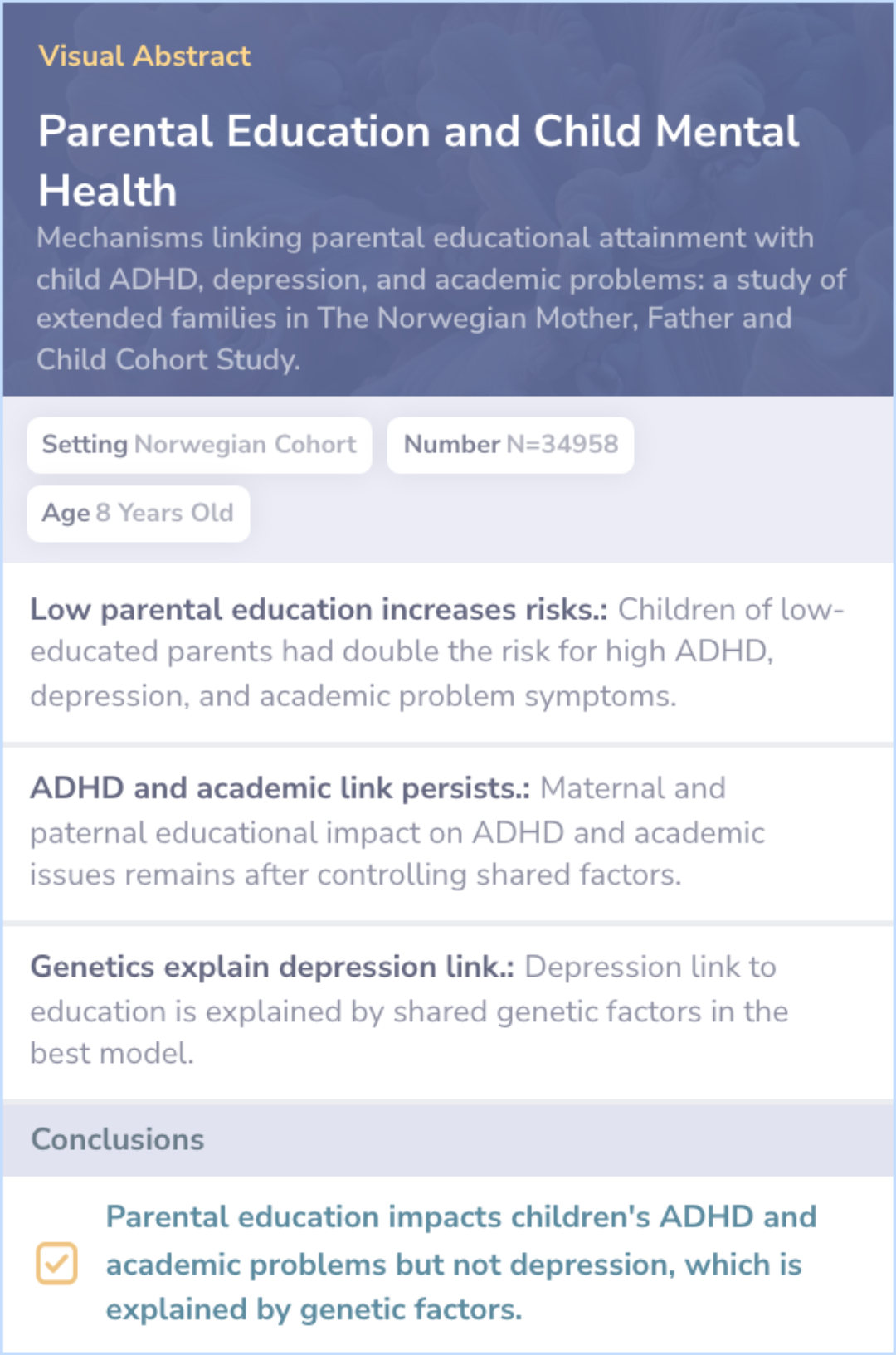
Literature Review
Axelrud et al.
Core Insight:Both papers focus on how parents' genetics influence their children's behavior. The main paper emphasizes genetic transmission of ADHD traits, while this paper explores how parental genetics affect children's cognition and education through genetic and behavioral channels.
What It Adds:
Different Pathways: The comparison paper highlights phenotypic transmission, unlike the main paper.
No Psychopathology Link: This paper found no parental psychopathology association, differing from the main paper.
Shared Themes:Both studies reveal the influence of parental genetics on offspring traits, underscoring genetic transmission's role.
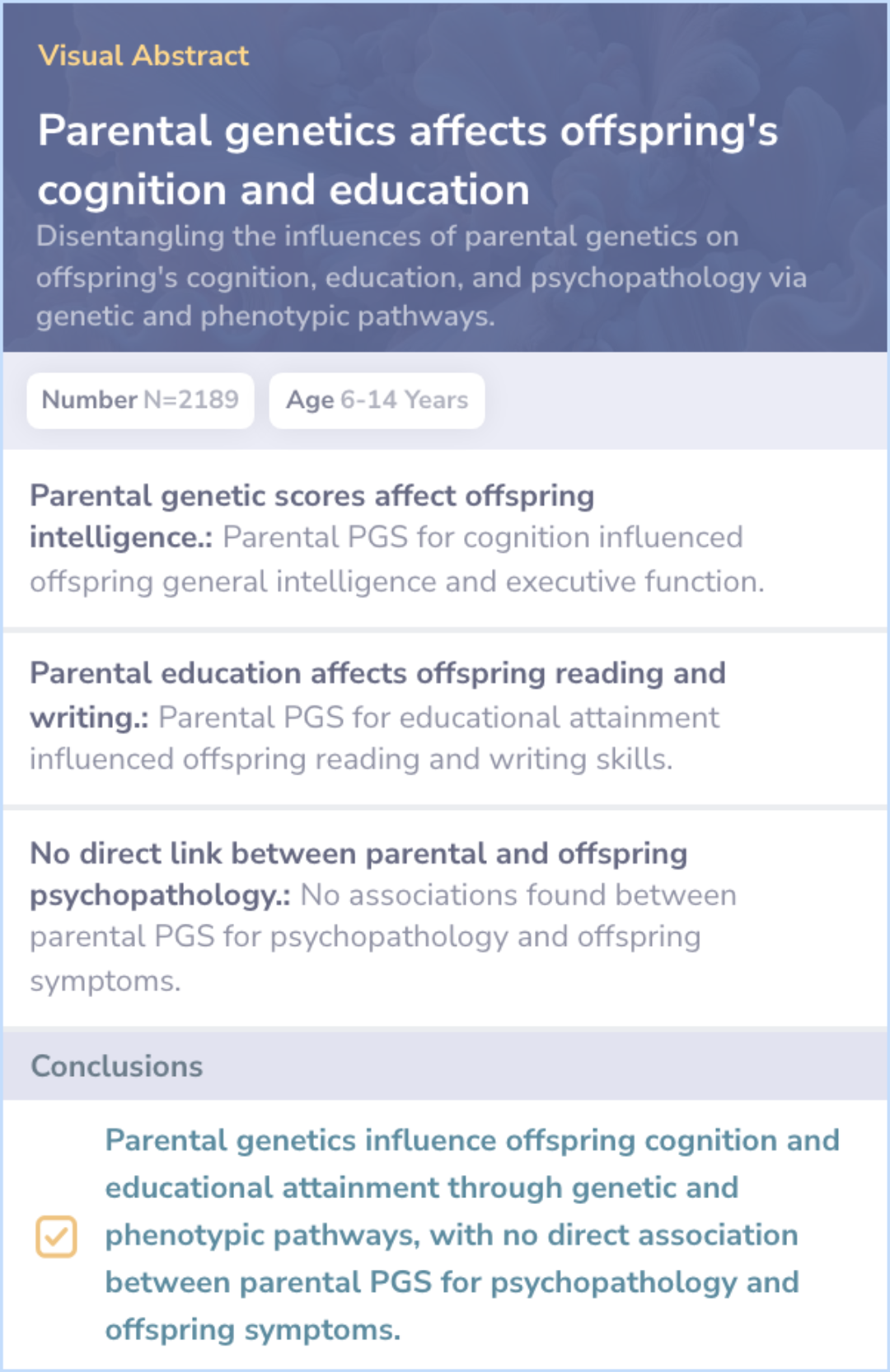
Literature Review
Havdahl et al
Core Insight:This paper highlights genetic factors in pregnancy as confounding variables, affecting beliefs about causality in prenatal influences on children's development.
What It Adds:
Genetic Liability and Neurodevelopment: Associates pregnancy exposures with maternal genetic links.
Father vs. Mother PGS Insights: Differentiates effects between maternal and paternal risk.
